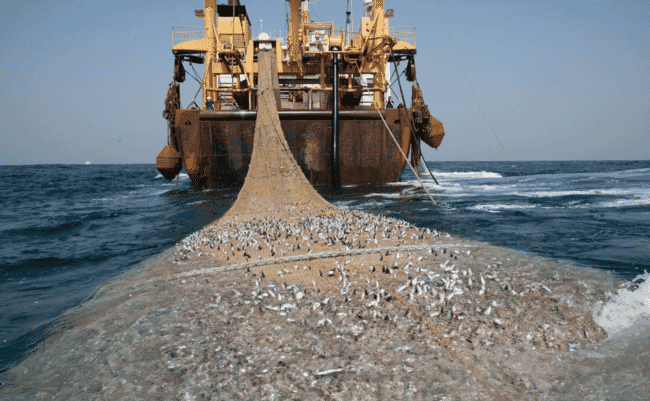
DeSmog argues that the industrial scale capture of small pelagic fish stocks off the coast of West Africa for conversion into fishmeal and fish oil threatens food security in the region © Pierre Gleizes, Greenpeace
The publication by DeSmog - an organisation which primarily focuses on "climate accountability" - precedes the UN's Food and Agriculture Organization's Fisheries meeting in Rome (8-12 July) where sustainability and social responsibility in the aquaculture sector will be under discussion.
In the report DeSmog mapped the membership of three major sustainability initiatives set up by global players and buyers in the fishmeal and fish oil industry that are active in West Africa: The MarinTrust certification programme, the Global Roundtable on Marine Ingredients and a fishery improvement project in Mauritania.
According to DeSmog’s report:
- There are no representatives of West Africa civil society, women fish processors or artisanal fishers on any of the three industry-led fisheries sustainability initiatives.
- Major aquafeed companies involved in all three initiatives – Cargill, Skretting and BioMar – are all currently sourcing from West Africa, have plans to increase production, and have targets to increase certified ingredients in their products.
- Employees holding leadership roles at Biomar, Cargill and fishmeal company Pelagia have seats on the MarinTrust certification programme’s governance structures, including the standard-steering, governing body and technical committees.
- MarinTrust has higher levels of industry representation on its executive bodies compared to other equivalent certifiers. (83 percent, compared to 33 percent at the Aquaculture Stewardship Council and 11 percent at the Marine Stewardship Council).
- Between the three initiatives only two NGOs – both international – are listed as participating at an executive level: WWF UK and the Sustainable Fisheries Partnership (SFP). The former received over $1 million USD income from corporations in 2022 (nearly 20 percent of its turnover).
- At least three of the trade groups and companies involved in the initiatives have a history of lobbying against environmental regulations.
Andre Standing from the Coalition for Fair Fisheries Arrangements (CFFA), a platform of European and African-based organisations, said: “Private initiatives driven by powerful multinational companies will make things worse. Multiple factors drive the threats to small pelagic fish stocks in West Africa and the resulting threats to food security. Any successful response must be based on transparency, public participation, and the meaningful inclusion of representatives from artisanal fishers and workers.”
Dyhia Belhabib, from the non-profit EcoTrust Canada, said: “I support industry involvement in certification and sustainability programmes but you have to ensure an arm’s length approach. This is clearly built by the industry for the industry.”




